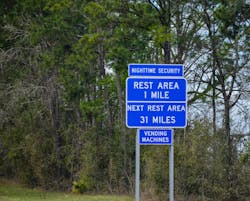At first glance, any legislation that opens up new business opportunities looks positive. Proposed bill H.R. 1990 in the 115th Congress by Congressman Jim Banks of Indiana, is one such bill. It would lift the ban on what types of service can be offered at rest stops, sometimes called rest areas, along interstate highways. Specifically, that private businesses could start operating at these facilities in exchange for taking over some of the cost of maintaining them. This is commercialization.
Most are not commercialized
There are commercialized rest stops or those that allow restaurants, truck stops, coffee shops, etc. in 15 states that were grandfathered in before the ban was made law in the 1950s. Most rest stops, however, only make allowances for businesses that operate under the Randolph-Sheppard Act and Kennelly Amendment to the Surface Transportation Act. The National Federation of the Blind (NFBC) calculated that in 2017, 20 percent of blind entrepreneurs operated vending machines at interstate rest stops under these acts. That is roughly 400 operators that could be displaced by being forced to compete with more established businesses, the NFBC argues.
No operators will benefit
While opening rest stops to all businesses could arguably provide an opportunity for a vending contract to other operators, in would be short lived. Restaurants and travel plazas with 24-hour service are the most likely candidates in rest stops if commercialization is approved. Having around the clock access to quick service food and convenience store options would eliminate the need for vending machines of any type on these properties. Therefore, NAMA and a number of other organizations are opposing the bill and encourage operators in the convenience services industry to ask their members of Congress to do the same.
Background of H.R. 1990
In February, the Trump administration listed rest stop commercialization as a financing mechanism in its full infrastructure proposal, according to NATSO, the association representing travel plaza and truckstop owners, citing the Bureau of National Affairs. States have been struggling with the costs of rest stop upkeep and are looking for ways to subsidize or remove them from their budgets.
Supporters of commercialization believe it will generate additional tax revenue. The opposition argues that commercialization will lead to less tax revenue and reduced employment. Travelers currently need to exit the interstate to visit restaurants and other business, providing jobs and tax revenue. With commercialization, the number of businesses will likely decrease. NATSO shows a statistic that the number of businesses differs greatly if it’s a state that has commercialized rest stops. In Maryland, which has commercialization, the NATSO reported 201 interstate-based businesses in a 100+mile stretch of I-95. In Virginia, which does not have commercialization, there were 858 interstate businesses along I-95. It’s an on-going debate, but for the convenience services industry the impact is negative.

Emily Refermat
Emily began covering the vending industry in 2006 and became editor of Automatic Merchandiser in 2012. Usually, Emily tries the new salted snack in the vending machine, unless she’s on deadline — then it’s a Snickers.
Emily resigned from Automatic Merchandiser and VendingMarketWatch.com in 2019 to pursue other opportunities.





